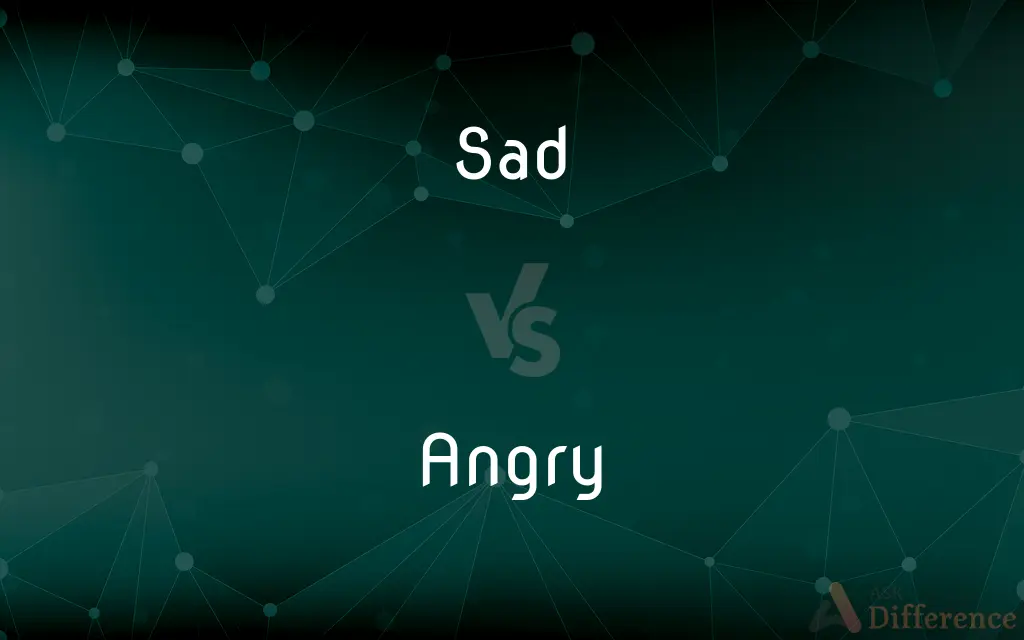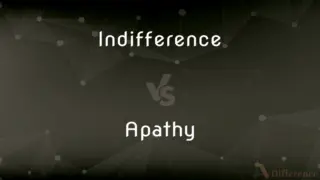Sad vs. Angry — What's the Difference?
Edited by Tayyaba Rehman — By Urooj Arif — Updated on April 9, 2024
Sadness is an emotional state characterized by feelings of disappointment, loss, or helplessness, while anger is a response to perceived wrongs or frustration.

Difference Between Sad and Angry
Table of Contents
ADVERTISEMENT
Key Differences
Sadness and anger are distinct emotional responses to different types of situations or stimuli. Sadness often arises from experiences of loss, disappointment, or helplessness, enveloping the individual in a state of sorrow and despondency. On the other hand, anger stems from situations perceived as unjust, frustrating, or threatening, fueling a reaction aimed at addressing or rectifying the perceived wrong.
While sadness tends to be introspective, leading individuals to withdraw and reflect, anger is typically outward-facing, prompting actions to confront or change the situation. The inward focus of sadness can result in contemplation and sometimes a deeper understanding of personal values and priorities. Conversely, the outward expression of anger may lead to conflict resolution, but it can also escalate tensions if not managed properly.
Sadness is often associated with a desire for comfort, support, or solace from others, encouraging empathy and strengthening social bonds. In contrast, anger can lead to assertiveness and the establishment of boundaries, which are crucial for personal and social dynamics. However, excessive anger might strain relationships and create distance between individuals.
The physiological effects of these emotions also differ; sadness can lead to decreased energy levels, a sense of lethargy, and sometimes physical manifestations like crying. Anger, however, often triggers a surge in energy, heightened alertness, and physical reactions such as increased heart rate or tension.
Despite their differences, both sadness and anger are natural, valid emotional responses that serve important functions in human behavior and social interaction. Recognizing and understanding these emotions in oneself and others is vital for emotional intelligence and healthy relationships.
ADVERTISEMENT
Comparison Chart
Emotional Cue
Loss, disappointment, helplessness
Injustice, frustration, threats
Typical Response
Withdrawal, reflection
Confrontation, assertiveness
Social Function
Seeks comfort, encourages empathy
Establishes boundaries, prompts action
Physiological Effects
Decreased energy, crying
Increased energy, heightened alertness
Outcome
Can lead to deeper understanding and empathy
May resolve or escalate conflicts
Compare with Definitions
Sad
Can lead to introspection and personal growth.
The sadness from the experience taught her a lot about resilience.
Angry
Can be a motivating force for setting boundaries or demanding respect.
His anger about being overlooked prompted him to demand recognition.
Sad
A feeling of sorrow or unhappiness often triggered by negative events.
She felt a deep sadness after hearing the news of her friend's illness.
Angry
An emotional response to perceived wrongs or injustices.
He felt a surge of anger when he saw the unfair treatment of his colleague.
Sad
Often expressed through tears or a somber demeanor.
The movie's tragic ending left them all in tears, overcome with sadness.
Angry
Leads to a desire to confront or change the situation.
Her anger drove her to speak out against the policy.
Sad
Encourages seeking support and empathy from others.
In her sadness, she found comfort in the understanding words of a friend.
Angry
While it can fuel positive change, unchecked anger may harm relationships.
His unchecked anger during the argument strained their friendship.
Sad
Characterized by a sense of loss and the desire to withdraw.
Overwhelmed with sadness, he preferred to spend the evening alone.
Angry
Often associated with physical signs like clenched fists or a raised voice.
In a moment of anger, her voice rose and her stance became defensive.
Sad
Feeling or showing sorrow; unhappy
They looked at her with sad, anxious faces
I was sad and subdued
Angry
Feeling or showing strong annoyance, displeasure, or hostility; full of anger
Why are you angry with me?
I'm angry that she didn't call me
Sad
Pathetically inadequate or unfashionable
The show is tongue-in-cheek—anyone who takes it seriously is a bit sad
Angry
Feeling or showing anger; incensed or enraged
Angry at my boss.
Angry with her.
Sad
(of dough) heavy through having failed to rise.
Angry
Indicative of or resulting from anger
An angry silence.
Sad
Showing, expressing, or feeling sorrow or unhappiness
A sad face.
Angry
Having a menacing aspect; threatening
Angry clouds on the horizon.
Sad
Causing sorrow or gloom; depressing
A sad movie.
Sad news.
Angry
Chiefly New England & Midland US Inflamed and painful
An angry sore.
Sad
Deplorable or inadequate; sorry
A sad state of affairs.
A sad excuse.
Angry
Displaying or feeling anger.
His face became angry.
An angry mob started looting the warehouse.
Sad
Dark-hued; somber.
Angry
(said about a wound or a rash) inflamed and painful.
The broken glass left two angry cuts across my arm.
Sad
(heading) Emotionally negative.
Angry
Dark and stormy, menacing.
Angry clouds raced across the sky.
Sad
Feeling sorrow; sorrowful, mournful.
She gets sad when he's away.
Angry
Troublesome; vexatious; rigorous.
God had provided a severe and angry education to chastise the forwardness of a young spirit.
Sad
Appearing sorrowful.
The puppy had a sad little face.
Angry
Inflamed and painful, as a sore.
Sad
Causing sorrow; lamentable.
It's a sad fact that most rapes go unreported.
Angry
Touched with anger; under the emotion of anger; feeling resentment; enraged; - followed generally by with before a person, and at before a thing.
Be not grieved, nor angry with yourselves.
Wherefore should God be angry at thy voice?
Sad
Poor in quality, bad; shameful, deplorable; later, regrettable, poor.
That's the saddest-looking pickup truck I've ever seen.
Angry
Showing anger; proceeding from anger; acting as if moved by anger; wearing the marks of anger; as, angry words or tones; an angry sky; angry waves.
Sad
Of colours: dark, deep; later, sombre, dull.
Angry
Red.
Sweet rose, whose hue, angry and brave.
Sad
(obsolete) Sated, having had one's fill; satisfied, weary.
Angry
Sharp; keen; stimulated.
I never ate with angrier appetite.
Sad
(obsolete) Steadfast, valiant.
Angry
Feeling or showing anger;
Angry at the weather
Angry customers
An angry silence
Sending angry letters to the papers
Sad
(obsolete) Dignified, serious, grave.
Angry
(of the elements) as if showing violent anger;
Angry clouds on the horizon
Furious winds
The raging sea
Sad
(obsolete) Naughty; troublesome; wicked.
Angry
Severely inflamed and painful;
An angry sore
Sad
(slang) Unfashionable; socially inadequate or undesirable.
I can't believe you use drugs; you're so sad!
Sad
(dialect) Soggy (to refer to pastries).
Sad
(obsolete) Heavy; weighty; ponderous; close; hard.
Sad
To make melancholy; to sadden or grieve (someone).
Sad
Sated; satisfied; weary; tired.
Yet of that art they can not waxen sad,For unto them it is a bitter sweet.
Sad
Heavy; weighty; ponderous; close; hard.
His hand, more sad than lump of lead.
Chalky lands are naturally cold and sad.
Sad
Dull; grave; dark; somber; - said of colors.
Woad, or wade, is used by the dyers to lay the foundation of all sad colors.
Sad
Serious; grave; sober; steadfast; not light or frivolous.
Lady Catharine, a sad and religious woman.
Which treaty was wisely handled by sad and discrete counsel of both parties.
Sad
Affected with grief or unhappiness; cast down with affliction; downcast; gloomy; mournful.
First were we sad, fearing you would not come;Now sadder, that you come so unprovided.
The angelic guards ascended, mute and sad.
Sad
Afflictive; calamitous; causing sorrow; as, a sad accident; a sad misfortune.
Sad
Hence, bad; naughty; troublesome; wicked.
Sad
To make sorrowful; to sadden.
How it sadded the minister's spirits!
Sad
Seasonal affective disorder.
Sad
Experiencing or showing sorrow or unhappiness;
Feeling sad because his dog had died
Better by far that you should forget and smile / Than that you should remember and be sad
Sad
Of things that make you feel sad;
Sad news
She doesn't like sad movies
It was a very sad story
When I am dead, my dearest, / Sing no sad songs for me
Sad
Bad; unfortunate;
My finances were in a deplorable state
A lamentable decision
Her clothes were in sad shape
A sorry state of affairs
Common Curiosities
What are common expressions of anger?
Common expressions of anger include confrontation, raised voice, and physical tension.
What triggers sadness?
Sadness is often triggered by experiences of loss, disappointment, or helplessness.
How do people usually express sadness?
People often express sadness through withdrawal, tears, or a somber demeanor.
What causes anger?
Anger is typically caused by perceptions of injustice, frustration, or threats.
Can sadness have positive outcomes?
Yes, sadness can lead to introspection, personal growth, and deeper social connections.
What strategies can help manage sadness?
Strategies for managing sadness include seeking support, engaging in self-care, and allowing oneself to grieve.
How does sadness affect social relationships?
Sadness can strengthen social bonds through shared empathy and support.
What role does anger play in personal boundaries?
Anger can help establish and enforce personal boundaries and respect.
What are effective ways to handle anger?
Effective anger management includes identifying triggers, practicing relaxation techniques, and expressing feelings constructively.
Is anger always negative?
No, anger can be a constructive force if it motivates positive change and is expressed healthily.
Can you control feelings of sadness and anger?
While it's not always possible to control these feelings, one can learn to manage their expression and impact.
Can sadness turn into anger?
Yes, sadness can evolve into anger, especially if the underlying causes of sadness are perceived as unjust or preventable.
Is it healthy to suppress sadness or anger?
Suppressing emotions can be harmful in the long run; acknowledging and expressing them healthily is generally more beneficial.
How do sadness and anger differ in their physiological effects?
Sadness often leads to decreased energy and lethargy, while anger increases energy and alertness.
Do sadness and anger serve a purpose?
Yes, both emotions serve important functions in signaling needs, prompting reflection, and facilitating social and personal change.
Share Your Discovery

Previous Comparison
Hannibal vs. Cannibal
Next Comparison
Indifference vs. ApathyAuthor Spotlight
Written by
Urooj ArifUrooj is a skilled content writer at Ask Difference, known for her exceptional ability to simplify complex topics into engaging and informative content. With a passion for research and a flair for clear, concise writing, she consistently delivers articles that resonate with our diverse audience.
Edited by
Tayyaba RehmanTayyaba Rehman is a distinguished writer, currently serving as a primary contributor to askdifference.com. As a researcher in semantics and etymology, Tayyaba's passion for the complexity of languages and their distinctions has found a perfect home on the platform. Tayyaba delves into the intricacies of language, distinguishing between commonly confused words and phrases, thereby providing clarity for readers worldwide.
















































